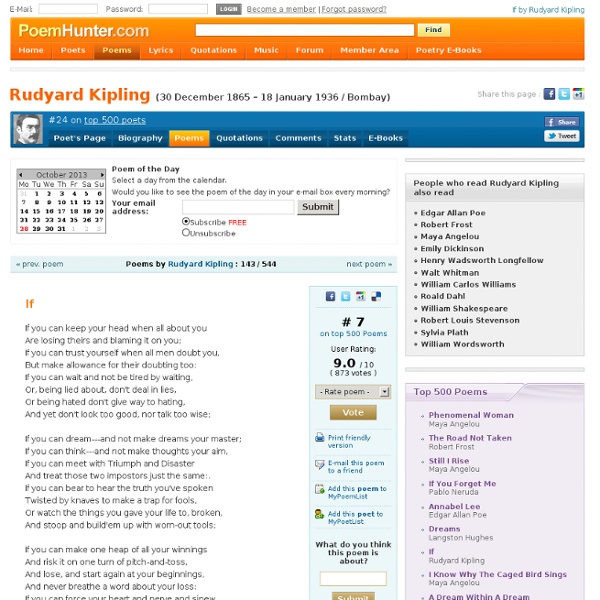



Jabberwocky by Lewis Carroll 'Twas brillig, and the slithy tovesDid gyre and gimble in the wabe:All mimsy were the borogoves,And the mome raths outgrabe. 'Beware the Jabberwock, my son!The jaws that bite, the claws that catch!Beware the Jubjub bird, and shunThe frumious Bandersnatch!' He took his vorpal sword in hand:Long time the manxome foe he sought --So rested he by the Tumtum tree,And stood a while in thought. And, as in uffish thought he stood,The Jabberwock, with eyes of flame,Came whiffling through the tulgey wood,And burbled as it came! One two! 'And hast thou slain the Jabberwock? 'Twas brillig, and the slithy tovesDid gyre and gimble in the wabe:All mimsy were the borogoves,And the mome raths outgrabe.
Dreams by Langston Hughes Dreams by Langston Hughes Live Scores Click here to see the rest of the list Share this page : Langston Hughes (1 February 1902 – 22 May 1967 / Missouri) #7 on top 500 poets Poems by Langston Hughes : 22 / 93 Listen to this poem: # 5 on top 500 Poems User Rating: ( 1,430 votes ) Report Poem What do you think this poem is about? For Example: love, art, fashion, friendship and etc. Dreams Hold fast to dreamsFor if dreams dieLife is a broken-winged birdThat cannot fly.Hold fast to dreamsFor when dreams goLife is a barren fieldFrozen with snow. Langston Hughes Submitted: Friday, January 03, 2003 Read poems about / on: snow, life, dream Langston Hughes's Other Poems More poems of Langston Hughes » Read this poem in other languages This poem has not been translated into any other language yet. I would like to translate this poem » What do you think this poem is about? Comments about this poem (Dreams by Langston Hughes ) Enter the verification code : Read all 249 comments » People who read Langston Hughes also read
Stopping by Woods on a Snowy Evening by Robert Frost Whose woods these are I think I know. His house is in the village though; He will not see me stopping here To watch his woods fill up with snow. My little horse must think it queer To stop without a farmhouse near Between the woods and frozen lake The darkest evening of the year. He gives his harness bells a shake To ask if there is some mistake. The only other sound’s the sweep Of easy wind and downy flake. The woods are lovely, dark and deep, But I have promises to keep, And miles to go before I sleep, And miles to go before I sleep. Robert Frost, “Stopping by Woods on a Snowy Evening” from The Poetry of Robert Frost, edited by Edward Connery Lathem. Source: Collected Poems, Prose, & Plays (Library of America, 1995) Biography Robert Frost holds a unique and almost isolated position in American letters. Continue reading this biography
The Second Coming - Yeats William Butler Yeats (1865-1939) Turning and turning in the widening gyre The falcon cannot hear the falconer; Things fall apart; the centre cannot hold; Mere anarchy is loosed upon the world, The blood-dimmed tide is loosed, and everywhere The ceremony of innocence is drowned; The best lack all conviction, while the worst Are full of passionate intensity. Surely some revelation is at hand; Surely the Second Coming is at hand. The darkness drops again but now I know That twenty centuries of stony sleep Were vexed to nightmare by a rocking cradle, And what rough beast, its hour come round at last, Slouches towards Bethlehem to be born? The Second Coming was written in 1919 in the aftermath of the first World War. This printing of the poem has a page break between lines 17 and 18 making the stanza division unclear. Several of the lines in the version above differ from those found in subsequent versions. Yeats, William Butler.
Shakespeare Sonnet 29 - When, in disgrace with fortune and men's eyes More to Explore Introduction to Shakespeare's Sonnets Shakespearean Sonnet Style How to Analyze a Shakespearean Sonnet The Rules of Shakespearean Sonnets Shakespeare's Sonnets: Q & A Are Shakespeare's Sonnets Autobiographical? Petrarch's Influence on Shakespeare Themes in Shakespeare's Sonnets Shakespeare's Greatest Love Poem Shakespeare and the Earl of Southampton The Order of the Sonnets The Date of the Sonnets Who was Mr. Who was The Rival Poet? Revenge in Hamlet Deception in Hamlet The Hamlet and Ophelia Subplot The Norway (Fortinbras) Subplot Blank Verse and Diction in Shakespeare's Hamlet Hamlet's Silence Analysis of the Characters in Hamlet Hamlet's Humor: The Wit of Shakespeare's Prince of Denmark Hamlet as National Hero Hamlet's Melancholy: The Transformation of the Prince Hamlet's Antic Disposition: Is Hamlet's Madness Real?
Shakespeare Sonnet 116 - Let me not to the marriage of true minds More to Explore Introduction to Shakespeare's Sonnets Shakespearean Sonnet Style How to Analyze a Shakespearean Sonnet The Rules of Shakespearean Sonnets Shakespeare's Sonnets: Q & A Are Shakespeare's Sonnets Autobiographical? Petrarch's Influence on Shakespeare Themes in Shakespeare's Sonnets Shakespeare's Greatest Love Poem Shakespeare and the Earl of Southampton The Order of the Sonnets The Date of the Sonnets Who was Mr. Who was The Rival Poet? Shakespeare on Jealousy Shakespeare on Lawyers Shakespeare on Lust Shakespeare on Marriage Blank Verse and Diction in Shakespeare's Hamlet Analysis of the Characters in Hamlet Shakespeare on the Seasons Shakespeare on Sleep
I Can't Remember by Carice Zum Hofe - Hello Poetry